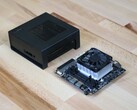(April 9, 2019 update: The page here refers to the new second generation mobile Ryzen Pro 3x00U family which offers additional security features over the standard consumer Ryzen 3x00U series. The consumer Ryzen 3x00U series has been available since January of this year.)
AMD briefly touched upon it during CES 2019, but now it's ready for prime time: the Ryzen Zen+ series of U-class SoCs is launching this Spring to directly tackle the prevalent Intel Whiskey Lake-U series.
As shown by our table below, the top-end Ryzen 7 Pro 3700U and Ryzen 5 Pro 3500U will supplant the last generation Ryzen 7 Pro 2700U and Ryzen 5 Pro 2500U, respectively. AMD is promising both faster base clock rates and slower Boost clock rates when compared to the Intel Core i5-8265U and i7-8565U in order to provide more predictable levels of performance across its Zen+ lineup.
| Core/Thread | Boost/Base Frequency | Integrated GPU | Cache L2+L3 | Node, Code name | |
|---|---|---|---|---|---|
| Ryzen Pro 7 3700U | 4C/8T | 4.0/2.3 GHz | Vega 10 | 6 MB | 12 nm, Zen+ |
| Ryzen Pro 5 3500U | 4C/8T | 3.7/2.1 GHz | Vega 8 | 6 MB | 12 nm, Zen+ |
| Ryzen Pro 3 3300U | 4C/4T | 3.5/2.1 GHz | Vega 6 | 6 MB | 12 nm, Zen+ |
| Athlon Pro 300U | 2C/4T | 3.3/2.4 GHz | Vega 3 | 5 MB | 12 nm, Zen+ |
| Core i7-8565U | 4C/8T | 4.6/1.8 GHz | UHD 620 | 9 MB | 14 nm, Whiskey Lake-U |
| Core i5-8265U | 4C/8T | 3.9/1.6 GHz | UHD 620 | 7 MB | 14 nm, Whiskey Lake-U |
| Core i3-8145U | 2C/4T | 3.9/2.1 GHz | UHD 620 | 4.5 MB | 14 nm, Whiskey Lake-U |
| Pentium 4415U | 2C/4T | 2.3 GHz | HD 610 | 2.5 MB | 14 nm, Kaby Lake |
| Ryzen 7 2700U | 4C/8T | 3.8/2.2 GHz | Vega 10 | 6 MB | 14 nm, Zen |
| Ryzen 5 2500U | 4C/8T | 3.6/2.0 GHz | Vega 8 | 6 MB | 14 nm, Zen |
| Ryzen 3 2300U | 4C/4T | 3.4/2.0 GHz | Vega 6 | 6 MB | 14 nm, Zen |
TDP will continue to be 15 W to 25 W across the Zen+ series. The upper limit is generally higher than the Whiskey Lake-U series since AMD's integrated Vega GPU is much more powerful than the aging Intel UHD Graphics 620 series. Gen-to-gen GPU performance from last year's Ryzen Zen series, however, will still be about the same.
Nevertheless, the mobile Zen+ series should be more power efficient than the mobile Zen series since the fabrication process has moved from 14 nm to 12 nm. AMD is claiming over 12 hours of battery life or up to 10 percent of video playback on laptops equipped with Zen+ APUs. Of course, real-world runtimes will also depend heavily on OEM implementation of the processors.
In general, however, the Zen+ series is but a stopgap before the impending Zen 2 series which is expected to bring much larger performance benefits. The second generation Ryzen Pro 7 3700U, for example, is merely 100 to 200 MHz faster than the first generation Ryzen 7 2700U. We're expecting minor performance benefits much like the jump from Intel Kaby Lake-R to Whiskey Lake-U.
Lenovo and HP are expected to be the first OEMs to ship "premium" Zen+ laptops later this year. Nearly all OEMs do not include Ryzen options for their flagship families and so we have yet to see Dell XPS laptops, HP Spectre laptops, or Lenovo Yoga 900 laptops equipped with AMD processors. We're hopeful that this will change soon because the new Ryzen U-series has proven to be comparable to the Intel U-series as far as performance is concerned.
Source(s)
AMD























